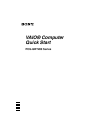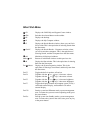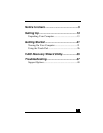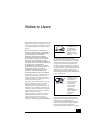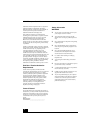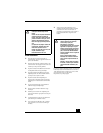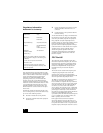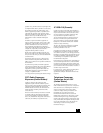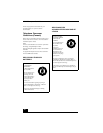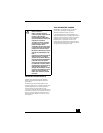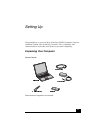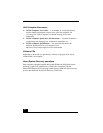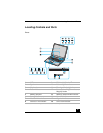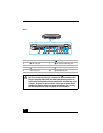
Notice to Users
9
possible. Also, you will be advised of your right to file
a complaint with the FCC if you believe it is necessary.
The telephone company may make changes in its
facilities, equipment, operations, or procedures that
could affect the operation of the equipment. If this
happens, the telephone company will provide advance
notice in order for you to make the necessary
modifications in order to maintain uninterrupted
service.
If trouble is experienced with this equipment, for
repair or warranty information, please contact 1-888-
4-SONY-PC (1-888-476-6972), or write to the Sony
Customer Information Service Center, One Sony
Drive, Park Ridge, NJ 07656. If the equipment is
causing harm to the telephone network, the telephone
company may request that you disconnect the
equipment until the problem is resolved.
Repair of this equipment should be made only by a
Sony Service Center or Sony authorized agent. For a
Sony Service Center near you, call 1-888-4-SONY-PC
(1-888-476-6972).
Connection to party line service is subject to state
tariffs. Contact the state public utility commission,
public service commission, or corporation commission
for information.
If your home has specially wired alarm equipment
connected to the telephone line, ensure the installation
of this equipment does not disable your alarm
equipment. If you have questions about what will
disable alarm equipment, consult your telephone
company or a qualified installer.
Use a surge arrestor to protect against electrical surges.
FCC Radio Frequency
Exposure (United States)
(Applies to wireless LAN models only) This
equipment complies with FCC radiation exposure
limits set forth for an uncontrolled environment. This
equipment should be installed and operated with
minimum distance of 8 inches (20 cm) between the
radiator and body (excluding extremities: hands,
wrists, and feet).
This device and its antenna(s) must not be co-located
or operating with any other antenna or transmitter.
Users are not permitted to modify this transmitter
device. Any unauthorized change made to this device
could void your authority to operate this device.
IC RSS-210 (Canada)
(Applies to wireless LAN models only) Operation is
subject to the following two conditions: (1) this device
may not cause interference, and (2) this device must
accept any interference, including interference that
may cause undesired operation of the device.
To prevent radio interference to the licensed service,
this device is intended to be operated indoors and
away from windows to provide maximum shielding.
Equipment (or its transmit antenna) that is installed
outdoors is subject to licensing.
The term “IC:” before the certification / registration
number only signifies that the Industry Canada
technical specifications were met.
(S’applique aux modèles sans fil de LAN seulement)
L’utilisation de ce dispositif est autorisée seulement
aux conditions suivantes: (1) il ne doit pas produire de
brouillage et (2) l’utilisateur du dispositif doit être prêt
à accepter tout brouillage radioélectrique reçu, même
si ce brouillage est susceptible de compromettre le
fonctionnement du dispositif.
Pour empêcher que cet appareil cause du brouillage au
service faisant l’objet d’une licence, il doit être utilisé
à l’interieur et devrait être placé loin des fenêtres afin
de fournir un écran de blindage maximal. Si le matériel
(ou son antenne d’émission) est installé a l’exterieur, il
doit faire l’objet d’une licence.
L’expression “IC:” avant le numéro d’homologation /
enregistrement signifie seulement que les
spécifications techniques d’Industrie Canada ont été
respectées.
Telephone Consumer
Protection Act of 1991
(United States)
The Telephone Consumer Protection Act of 1991
makes it unlawful for any person to use a computer or
other electronic device, including FAX machines, to
send any message unless such message clearly
contains in a margin at the top or bottom of each
transmitted page or on the first page of the
transmission, the date and time it is sent and an
identification of the business or other entity, or other
individual sending the message, and the telephone
number of the sending machine or such business, other
entity, or individual. (The telephone number provided
may not be a 900 number or any other number for
which charges exceed local or long-distance
transmission charges.)



